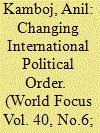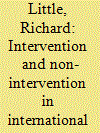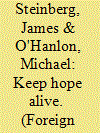|
|
|
Sort Order |
|
|
|
Items / Page
|
|
|
|
|
|
|
| Srl | Item |
| 1 |
ID:
165703


|
|
|
|
|
| Summary/Abstract |
Earlier, after the Second World War there were two super powers, United States and USSR, and the countries were divided into West Block or the East Block. Some countries wanted to remain as non-aligned. The global political order depended on which side that particular country wanted to lean. After the disintegration of USSR, the political order started changing. Russia started losing its domination and the vacuum thus created was being filled up by United States and other developed countries.
|
|
|
|
|
|
|
|
|
|
|
|
|
|
|
|
| 2 |
ID:
165720


|
|
|
|
|
| Summary/Abstract |
As the hub of global interaction, Central Asia is very crucial for the changing international political order. It is a large, landlocked region consisted of Kazakhstan, Uzbekistan, Kyrgyzstan, Tajikistan and Turkmenistan. It has been the hub of world’s most ancient civilizations for centuries, connecting Asia and Europe through the famous Silk road.
|
|
|
|
|
|
|
|
|
|
|
|
|
|
|
|
| 3 |
ID:
165718


|
|
|
|
|
| Summary/Abstract |
Every century, invariably at one or the other juncture was engaged in discussing the International Political order as it mattered to the nation states at large. Though the Westphalian system assured of some sort of an order, the world failed to understand the very notion of order, which is a prerequisite for its very existence.
|
|
|
|
|
|
|
|
|
|
|
|
|
|
|
|
| 4 |
ID:
140350


|
|
|
|
|
| Summary/Abstract |
This paper blends recent research on hierarchy and democratization to examine the theoretical and empirical costs of treating regime type exogenously in the literature most identified with studying its impact on international politics. It argues that the apparent peace among democratic states that emerges in the aftermath of World War I is not caused by domestic institutional attributes normally associated with democracy. Instead, this peace is an artifact of historically specific great power settlements. These settlements shape subsequent aggregate patterns of military conflict by altering the organizational configuration of the system in three critical ways—by creating new states, by altering hierarchical orders, and by influencing regime type in states. These claims are defended with a series of tests that show first how the statistical relationship between democracy and peace has exhibited substantial variation across great power orders; second, that this statistical relationship breaks down with theoretically motivated research design changes; and third, that great powers foster peace and similar regime types within their hierarchical orders. In short, the relationship between democracy and peace is spurious. The international political order is still built and managed by great powers.
|
|
|
|
|
|
|
|
|
|
|
|
|
|
|
|
| 5 |
ID:
165712


|
|
|
|
|
| Summary/Abstract |
The article on international political order summarizes the cooperation of different national and regional forces so as to represent the whole balance of efforts at different levels. It is a dispensation of new outlook, and understanding to catch the new narratives of international political order. The balance of international forces is taken into consideration for a harmonious international order.
|
|
|
|
|
|
|
|
|
|
|
|
|
|
|
|
| 6 |
ID:
124133


|
|
|
|
|
| Publication |
2013.
|
| Summary/Abstract |
This article aims to show that from the end of the eighteenth century, international order began to be defined in terms of ground rules relating to non-intervention and intervention, with the former being prioritised over the latter. After the Napoleonic wars, within continental Europe there was an attempt to consolidate an intervention ground rule in favour of dynastic legitimacy over the right of self-determination. By contrast, the British and Americans sought to ensure that this ground rule was not extended to the Americas where the ground rule of non-intervention was prioritised. During the nineteenth century, it was the Anglo-American position which came to prevail. Over the same period international order was increasingly bifurcated with the non-intervention ground rule prevailing in the metropolitan core and with the intervention ground rules prevailing in the periphery. This article, however, only focuses on the metropolitan core and draws on two case studies to examine the non-intervention ground rule in very different circumstances. The first examines the British response to the American Civil War in the 1860s during an era of stability in the international order. The second explores the British Response to the Spanish Civil War in the 1930s when the international order was very unstable and giving way to a very different international order.
|
|
|
|
|
|
|
|
|
|
|
|
|
|
|
|
| 7 |
ID:
132152


|
|
|
|
|
| Publication |
2014.
|
| Summary/Abstract |
At their summit in California last June, U.S. President Barack Obama and Chinese President Xi Jinping committed themselves to building trust between their countries. Since then, new official forums for communication have been launched (such as the military-to-military dialogues recently announced by the two countries' defense ministers), complementing existing forums such as the Strategic and Economic Dialogue (which features the countries' top diplomats and economic officials). But despite these efforts, trust in both capitals -- and in the countries at large -- remains scarce, and the possibility of an accidental or even intentional conflict between the United States and China seems to be growing. Given the vast potential costs such a conflict would carry for both sides, figuring out how to keep it at bay is among the most important international challenges of the coming years and decades. The factors undermining trust are easy to state. East Asia's security and economic landscape is undergoing massive, tectonic change, driven primarily by China's remarkable economic rise in recent decades. That economic miracle, in turn, has made it possible for China to increase its military capacity and ramp up its political role in the region and beyond. China's leaders and prominent strategists have been at pains to insist that China's rise will be peaceful and poses no threat to its neighbors or the existing international political and economic order. But many members of the world community remain concerned and even skeptical, noting that history and international relations theory are replete with examples of conflict arising from clashes between a dominant and a rising power."
|
|
|
|
|
|
|
|
|
|
|
|
|
|
|
|
| 8 |
ID:
165704


|
|
|
|
|
| Summary/Abstract |
Continuity and change is the core of alterations in international politics. Political systems have specific models to accommodate change . Authoritarian systems with a homogenous demography can adopt to change faster than democratic states with multi ethnic demography, multiple layers of social hierarchy and multi party systems. Technological innovations have facilitated change but political systems have adopted measures to suit their interest. Therefore ,decision making processes remain less altered compared to technological change. Economic interests have dominated at all levels of decision making local as well as global .
|
|
|
|
|
|
|
|
|
|
|
|
|
|
|
|
| 9 |
ID:
169953


|
|
|
|
|
| Summary/Abstract |
Summit diplomacy is the initiative to establish contact at the highest level of political leadership to transform the relationship between collectives. The heads of states are key decision makers in the nation. The objective of summit diplomacy is to establish a political dialogue at the highest level. The assumption is that once the understanding is established at the highest level, it can transform a conflicting relationship to friendly one. Rajiv Gandhi’s visit to China in 1988 ended three decades of estrangement between India and China. It is a classic example of the normalisation of relations between two countries. The proposed hypothesis is that the success of Rajiv Gandhi’s summit diplomacy depended on two factors: the leadership personality and the domestic factor. This article primarily deals with the question: How Rajiv Gandhi conducted summit diplomacy with China in 1988? The article traces the process through an analysis of archival work of private papers and diplomatic correspondence, oral history interviews, memoirs, and biographical works.
|
|
|
|
|
|
|
|
|
|
|
|
|
|
|
|
|
|
|
|
|